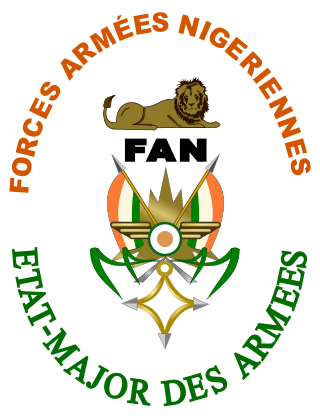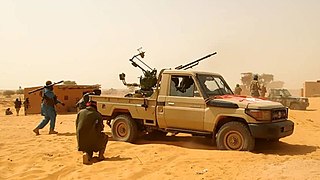| Battle of Adrar Bouss | |||||||
|---|---|---|---|---|---|---|---|
| Part of Jihadist insurgency in Niger | |||||||
| |||||||
| Belligerents | |||||||
| | | ||||||
| Strength | |||||||
| Unknown | Unknown | ||||||
| Casualties and losses | |||||||
| 1 | 3 | ||||||
The Battle of Adrar Bouss was fought on 15 September 2011 between the armed forces of Niger and ISIS.
| Battle of Adrar Bouss | |||||||
|---|---|---|---|---|---|---|---|
| Part of Jihadist insurgency in Niger | |||||||
| |||||||
| Belligerents | |||||||
| | | ||||||
| Strength | |||||||
| Unknown | Unknown | ||||||
| Casualties and losses | |||||||
| 1 | 3 | ||||||
The Battle of Adrar Bouss was fought on 15 September 2011 between the armed forces of Niger and ISIS.
On September 15, 2011, near Adrar Bouss, 400 kilometers northeast of Agadez, in the northern part of the Aïr Massif, a skirmish occurred between a detachment of the Nigerien army and ISIS fighters. [1] [2]
According to a statement from the Nigerien Ministry of Defense, the outcome was one killed and two injured among the military, with three deaths reported on the jihadist side. Additionally, the soldiers seized an RPG-7 rocket launcher, three AK-47 rifles, a machine gun, and a significant quantity of ammunition. Two or three jihadist pick-up trucks were captured, and another was destroyed during the confrontation. The Nigerien army also claimed to have captured 59 young recruits of ISIS, who stated that they were recruited in Agadez by a Marabout from Tahoua and his assistant. Both individuals were subsequently arrested. [1] [2] [3]

The Niger Armed Forces includes military armed force service branches, paramilitary services branches and the National Police of Niger. The Army, Air Force and the National Gendarmerie are under the Ministry of Defense whereas the National Guard and the National Police fall under the command of the Ministry of Interior. With the exception of the National Police, all military and paramilitary forces are trained in military fashion. The President of Niger is the supreme commander of the entire armed forces. The National Assembly of Niger passed a statute for the Army of Niger in November 2020, planning for the army's size to increase from 25,000 personnel in 2020, to 50,000 in 2025 and finally 100,000 in 2030.

Mohamed Bazoum is a Nigerien politician who served as the 10th president of Niger from 2021 to 2023. He assumed office in April 2021 after winning the 2020–21 presidential election and surviving a failed coup d'état attempt. He was ousted in the 2023 Nigerien coup d'état by members of the presidential guard and the armed forces led by Abdourahamane Tchiani.

Hassoumi Massaoudou is a Nigerien politician who served as minister of Foreign Affairs of Niger from 2021 to 2023. He served as minister of Finance from October 2016 to January 2019. A leading member of the Nigerien Party for Democracy and Socialism (PNDS-Tarayya), he was minister of Communication, Culture, Youth and Sports from 1993 to 1994, president of the PNDS Parliamentary Group from 1999 to 2004, director of the Cabinet of the President from 2011 to 2013, minister of the Interior from 2013 to 2016, and minister of National Defense in 2016.

The 2007-2009 Tuareg rebellion was an insurgency that began in February 2007 amongst elements of the Tuareg people living in the Sahara desert regions of northern Mali and Niger. It is one of a series of insurgencies by formerly nomadic Tuareg populations, which had last appeared in the mid-1990s, and date back at least to 1916. Populations dispersed to Algeria and Libya, as well as to the south of Niger and Mali in the 1990s returned only in the late 1990s. Former fighters were to be integrated into national militaries, but the process has been slow and caused increased resentment. Malian Tuaregs had conducted some raids in 2005–2006, which ended in a renewed peace agreement. Fighting in both nations was carried on largely in parallel, but not in concert. While fighting was mostly confined to guerrilla attacks and army counterattacks, large portions of the desert north of each nation were no-go zones for the military and civilians fled to regional capitals like Kidal, Mali and Agadez, Niger. Fighting was largely contained within Mali's Kidal Region and Niger's Agadez Region. Algeria helped negotiate an August 2008 Malian peace deal, which was broken by a rebel faction in December, crushed by the Malian military and wholescale defections of rebels to the government. Niger saw heavy fighting and disruption of uranium production in the mountainous north, before a Libyan backed peace deal, aided by a factional split among the rebels, brought a negotiated ceasefire and amnesty in May 2009.
The Nigerien's Movement for Justice is a largely Tuareg ethnic, northern Niger based militant group. But the MNJ also includes other nomadic ethnicities, within this area, such as the Toubou and the Fulani have also joined the group, which has been battling the Niger government since 2007.

Ousmane Issoufou Oubandawaki is a Nigerien politician. An engineer by profession, specializing in civil aviation, Oubandawaki held various posts at ASECNA and served in the government of Niger under President Ibrahim Baré Mainassara, first as Minister of National Defense from 1996 to 1997 and then as Minister of Transport from 1997 to 1998. He was Director-General of ASECNA from January 1999 to December 2004.
Rhissa Ag Boula is a Nigerien Tuareg politician and former leader of rebel factions in both the 1990–1995 and the 2007–2009 Tuareg based Insurgencies. He was Nigerien Minister of Tourism from 1996–1999, and again from 1999–2004. His arrest on murder charges in 2004 precipitated armed conflict between his supporters and the Nigerien government. A political leader following the 1995 peace, he again joined a rebel faction from abroad in 2007, creating his own faction from abroad in 2008, and joining the peace process in 2009. In 2010 he was again arrested after returning to Niger.

The Islamic State – Sahel Province (ISSP), formerly known as Islamic State in the Greater Sahara (IS-GS), is an Islamist militant group adhering to the ideology of Salafi Jihadism. IS-GS was formed on 15 May 2015 as the result of a split within the militant group Al-Mourabitoun. The rift was a reaction to the adherence of one of its leaders, Adnan Abu Walid al-Sahraoui, to the Islamic State. From March 2019 to 2022, IS-GS was formally part of the Islamic State – West Africa Province (ISWAP); when it was also called "ISWAP-Greater Sahara". In March 2022, IS declared the province autonomous, separating it from its West Africa Province and naming it Islamic State – Sahil Province (ISSP).
The Battle of Timetrine was a battle between French forces and al-Qaeda in the Islamic Maghreb (AQIM) militants in Timetrine, in Tessalit.
Amadou Koufa, nom de guerre of Amadou Diallo, also spelled Hamadoun Kouffa or Amadou Kouffa is a Malian Fulani jihadist and preacher who founded Katiba Macina, later part of Jama'at Nasr al-Islam wal Muslimin.

On 9 January 2020, a large group of Islamic State in the Greater Sahara militants assaulted a Nigerien military base at Chinagodrar, in Niger's Tillabéri Region. They attacked an army post in Chinagodrar, in the west of the country, in Tillabéri Region, 13 kilometres from the border with Mali, 210 kilometres north of Niamey. At least 89 Nigerien soldiers were confirmed to have been killed in the attack, with more casualties suspected, making it the worst attack on the army since the start of the insurgency. The Nigerien government said that 77 militants were killed.

An ongoing war and civil conflict between the Government of Burkina Faso and Islamist rebels began in August 2015 and has led to the displacement of over 2 million people and the deaths of at least 10,000 civilians and combatants.

An Islamist insurgency has been ongoing in the Sahel region of West Africa since the 2011 Arab Spring. In particular, the intensive conflict in the three countries of Mali, Niger and Burkina Faso has been referred to as the Sahel War.
The Ménaka offensive was a series of offensives launched by the Islamic State in the Greater Sahara against the Malian Army, Tuareg self-defense groups including the Movement for the Salvation of Azawad (MSA) and Imghad Tuareg Self-Defense Group and Allies (GATIA), and the al-Qaeda-aligned Jama'at Nasr al-Islam wal Muslimin. The offensives took place in the Ménaka Cercle, in southeastern Mali.
Operation Tiésaba-Bourgou was a joint Franco-Malian operation against Jama'at Nasr al-Islam wal Muslimin and Ansarul Islam near the Malian, Burkinabe, and Nigerien borders.
On November 24, 2017, jihadists from Jama'at Nasr al-Islam wal Muslimin ambushed Nigerien MINUSMA peacekeepers and Malian soldiers in the village of Indelimane, Mali.
The raid on Tin Biden occurred between October 23 and 24, 2017, between French forces of Operation Barkhane and Jama'at Nasr al-Islam wal Muslimin in the remote wadi of Tin Biden, Kidal Region, Mali. In the battle, French forces killed eleven Malian prisoners of war held captive by JNIM.
Mohamed Akotey is a Nigerien politician of Ifoghas Tuareg heritage and former rebel leader.
On March 5, 2017, jihadists from Jama'at Nasr al-Islam wal Muslimin attacked Malian forces in Boulikessi. The attack was the first by JNIM since its inception that month.
The Battle of Touayel is a confrontation between Tunisian law enforcement forces and jihadists that took place in Tunisia in October 2013.